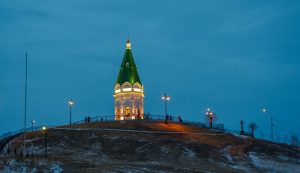
Historical and cultural heritage are natural monuments, structures, urban ensembles, memorial sites, objects related to historical events in the life of the people, the development of society and the state, as well as traditional values, norms representing cultural relevance to a group of individuals or society at a local, regional, national or international level. Being a very old country, Russia surely has a lot of both of the heritage on its land. Here, we will take a look at Krasnoyarsk’s historical heritage, specifically.
A Brief Look
Currently, in the Krasnoyarsk Territory, there are 2,006 objects of cultural heritage and 2,818 identified objects of cultural heritage and objects that have the features of a cultural heritage object. Among the monuments of history and culture accepted for state protection, 473 are of value from the point of view of architecture and urban planning, 435 from the point of view of history, 1,081 from the point of view of archeology, and 17 are objects of art.
Real estate objects of Krasnoyarsk territories are divided into buildings and structures (23.8%), works of monumental art (1.1%), archeology objects (57.6%), and burial places (17.5%).
The largest number of objects of value from the point of view of historical architecture and urban planning are concentrated in the cities of Krasnoyarsk, Yeniseisk, Achinsk, Minusinka and Kansk (424 objects, or 55.3% of the total number of monuments of historical architecture and urban planning).
The largest number of objects of value from the point of view of archeology is in the southwestern and southeastern regions, geographically located in the Khakass-Minusinsk intermountain basin: Balakhtinsky, Krasnoturansky, Kuraginsky, Minusinsky, Novoselovsky, Sharypovsky, Shushensky (532 objects, or 49.8% of the total number of archaeological heritage sites).
Top Historical Heritage Sites in Krasnoyarsk
Clearly there is not enough space in this article to list down all of the historical heritage objects from the region, since there are hundreds of them with 313 being the most notable ones. But, here are the most visited sites you can consider seeing when you visit the Krasnoyarsk territory next time.
1. Paraskeva Chapel Fridays
This chapel is one of the symbols of the city of Krasnoyarsk. It is an Orthodox building built on the top of the Karaulnaya Mountain, replacing the pagan Tatar-Kachin temple. Initially, Russian immigrants built a wooden watchtower in the place where the chapel now stands, from which the Cossacks examined the surroundings and, in case of danger, warned the townspeople about the disaster. At the dawn of the 19th century, the merchant Novikov was building a wooden chapel in memory of the miraculous deliverance from death in a whirlpool of a river threshold. There is an alternative version – the chapel was built by Krasnoyarsk residents as a sign of salvation from enemies.
The chapel is located on Mount Karaulnaya, Krasnoyarsk, Russia. On Sundays a salvo from a cannon is fired, which stands slightly lower on the mountain. The chapel itself is small and the place is a beauty with great views. For the most part from the viewing platform, which you need to visit both in the afternoon (Sunday noon) and always in the evening, it advised for you to take something warm to wear, just in case, because it can be windy. And grab a banknote of 10 rubles, compare and find the differences of the picture of the chapel from the bill with the real one.
2. Shalobolin Writings
This is the largest monument of ancient cave art in the Krasnoyarsk Territory. It is located 35 km west of the village of Kuragino, on a steep coastal rock mass. It occupies the right bank of the Tuba River. Shalobolinskaya Writings is considered a valuable asset of the whole planet. This gallery of cave paintings is several thousand years older than the Egyptian pyramids themselves! Petroglyphs here are very different, it’s understandable: artists have accumulated a lot of things for such a period – from the Neolithic to the present. Some images are simply carved in stone, some are painted with ocher.
Local residents always knew about the scribble and often visited the sacred place, wanting to touch the story. Virgin Siberian nature, carefully guarding the painted rocks, turned them into a kind of time machine that sends visitors to the 6th millennium BC. It is believed that it was then that the first person stepped on this earth.
3. Ob-Yenisei Connecting Waterway
It is a navigable water channel located between the basins of two mighty rivers – the Ob and the Yenisei. Currently, this is the territory of the Yenisei region of the Krasnoyarsk Territory.
The Ob-Yenisei Canal is called the Russian analogue of the Suez Canal. This is a truly unique engineering structure, which took 10 years (from 1883 to 1893) to be built by ordinary workers, struggling with the difficult conditions of the Siberian taiga. The construction was carried out without any special mechanisms; everything was done with the help of axes, shovels and a sledgehammer!
As a result of hard work of over 1200 people, 14 locks were installed, half of which are located in the Krasnoyarsk Territory, half in the Tomsk Region. According to legend, it was here that Kolchak hid his gold. Unfortunately, the canal was subsequently abandoned. The last major ship cut through the waterway was in 1942. Despite the fact that the canal is not operated for its intended purpose, lovers of water tourism constantly come here. Excursions along the Russian waterway are also very popular.
This valuable monument of Russian history, as well as hydraulic engineering building art, is in poor condition and is not protected by people, so it is possible to predict with some degree of certainty that in 10-20 years the water will absorb the last buildings and the Ob-Yenisei Canal will disappear from the face of the Earth.
